| Listing 1 - 7 of 7 |
Sort by
|
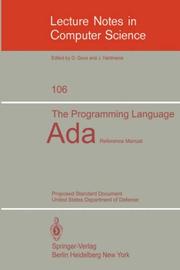
ISBN: 3540106936 0387106936 3540386203 9783540106937 Year: 1981 Volume: 106 Publisher: Berlin Springer
Abstract | Keywords | Export | Availability | Bookmark
 Loading...
Loading...Choose an application
- Reference Manager
- EndNote
- RefWorks (Direct export to RefWorks)
#TCPW P5.3 --- #TCPW P5.9 --- 681.3*D32 --- language classifications: applicative languages data-flow languages design languages extensible languages macro and assembly languages nonprocedural languages specialized application and very high-level languages (Programminglanguages) --- 681.3*D33 --- 681.3*D3m --- Languages constructs: abstract data types concurrent programming structurescontrol structures coroutines (Programming languages) --- Programming languages --- 681.3*D32 language classifications: applicative languages data-flow languages design languages extensible languages macro and assembly languages nonprocedural languages specialized application and very high-level languages (Programminglanguages) --- 681.3*D3m Programming languages --- 681.3*D33 Languages constructs: abstract data types concurrent programming structurescontrol structures coroutines (Programming languages) --- Ada (Computer program language) --- Handbooks, manuals, etc. --- Programming --- 681.3*D32 language classifications: applicative languages; data-flow languages; design languages; extensible languages; macro and assembly languages; nonprocedural languages; specialized application and very high-level languages (Programminglanguages) --- language classifications: applicative languages; data-flow languages; design languages; extensible languages; macro and assembly languages; nonprocedural languages; specialized application and very high-level languages (Programminglanguages) --- 681.3*D33 Languages constructs: abstract data types; concurrent programming structures;control structures; coroutines (Programming languages) --- Languages constructs: abstract data types; concurrent programming structures;control structures; coroutines (Programming languages) --- Computer science. --- Software engineering. --- Programming Languages, Compilers, Interpreters. --- Software Engineering/Programming and Operating Systems. --- Computer software engineering --- Engineering --- Informatics --- Science
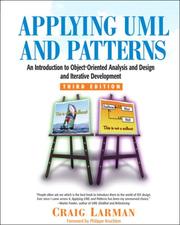
ISBN: 0131489062 9780131489066 Year: 2005 Publisher: New Jersey : Prentice-Hall,
Abstract | Keywords | Export | Availability | Bookmark
 Loading...
Loading...Choose an application
- Reference Manager
- EndNote
- RefWorks (Direct export to RefWorks)
This third edition again delivers a clear path for students and professionals to learn and apply object-oriented analysis and design. The first two editions of this book have achieved gross sales of more than 60,000 units through the domestic retail channel Timely and up-to-date; compliant with UML 2.0 and the latest trends in design patterns and object-oriented analysis and design More gold from one of the leading names in software engineering- Craig Larman! The mastery of object-oriented analysis and design (OOA/D) principles and concepts is critical for anyone seeking to create robust and maintainable object systems. This third edition presents a well-defined roadmap, so the reader can move along a step-by-step process from requirements gathering all the way to code generation. The author teaches the skill of OOA/D using the latest version of the industry standard modeling language (UML 2.0). He also allows the reader to learn and apply the popular concept of design patterns, and therefore helps readers accelerate their mastery of analysis and design. The author retains his thorough treatment of a single case study to help readers gain a big picture of successful software development. Once again, this book delivers, and furthers Craig Larman's name among software engineering luminaries.
Programming --- Computer architecture. Operating systems --- Object-georiënteerd programmeren --- objectgeoriënteerde systeemontwikkeling --- visuele modelleertalen --- computerarchitectuur --- 521 --- 525.1 --- Languages constructs: abstract data types concurrent programming structurescontrol structures coroutines (Programming languages) --- systeemanalyse, systeemontwerp, beheer en onderhoud van informatiesystemen --- Object-georiënteerd programmeren. --- 681.3*D33 Languages constructs: abstract data types concurrent programming structurescontrol structures coroutines (Programming languages) --- 681.3*D33 --- 681.3*D211 --- UML --- programmeertalen --- programmeren --- besturingssystemen --- systeemanalyse --- systeemontwerp --- informatica --- 525.5 --- infobib --- 681.3.06 --- Objectgeoriënteerd programmeren --- Programmeertalen : UML --- 681.3*D33 Languages constructs: abstract data types; concurrent programming structures;control structures; coroutines (Programming languages) --- Languages constructs: abstract data types; concurrent programming structures;control structures; coroutines (Programming languages) --- Software architectures: data abstractio, domain-specific architectures, information hiding, languages (e.g. description, interconnection, definition), patterns (e.g. client/server, pipeline, blackboard) --- C (informatica) --- object oriented analysis --- UML (unified modeling language) --- Object-oriented methods (Computer science) --- System analysis --- System design --- UML (Computer science) --- Object development methods (Computer science) --- Object orientation (Computer science) --- Object-oriented development (Computer science) --- Object technology (Computer science) --- Unified Modeling Language (Computer science) --- Computer software --- Modeling languages (Computer science) --- Design, System --- Systems design --- Electronic data processing --- Network theory --- Systems analysis --- System theory --- Mathematical optimization --- Development --- Network analysis --- Network science --- System analysis. --- Object-oriented methods (Computer science). --- System design. --- UML (Computer science). --- 004.4 --- Informatica --- Programmeertalen --- Programmeren --- Systeemontwikkeling
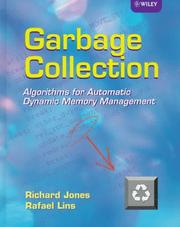
ISBN: 0471941484 9780471941484 Year: 1999 Publisher: Chichester Wiley
Abstract | Keywords | Export | Availability | Bookmark
 Loading...
Loading...Choose an application
- Reference Manager
- EndNote
- RefWorks (Direct export to RefWorks)
681.3*D33 --- 681.3*D34 --- 681.3*D34 Processors: code generation compilers interpreters optimization parsing preprocessors run-time environments translator writing systems and compilergenerators (Programming languages) --- Processors: code generation compilers interpreters optimization parsing preprocessors run-time environments translator writing systems and compilergenerators (Programming languages) --- 681.3*D33 Languages constructs: abstract data types concurrent programming structurescontrol structures coroutines (Programming languages) --- Languages constructs: abstract data types concurrent programming structurescontrol structures coroutines (Programming languages) --- Computer algorithms --- Garbage collection (Computer science) --- Memory management (Computer science) --- 681.3*D33 Languages constructs: abstract data types; concurrent programming structures;control structures; coroutines (Programming languages) --- Languages constructs: abstract data types; concurrent programming structures;control structures; coroutines (Programming languages) --- Management of computer memory --- Computer storage devices --- Loop tiling (Computer science) --- Algorithms --- 681.3*D34 Processors: code generation; compilers; interpreters; optimization; parsing; preprocessors; run-time environments; translator writing systems and compilergenerators (Programming languages) --- Processors: code generation; compilers; interpreters; optimization; parsing; preprocessors; run-time environments; translator writing systems and compilergenerators (Programming languages) --- Computer science --- geheugenbeheer --- algoritmen --- Programming --- Computer algorithms. --- Garbage collection (Computer science). --- Memory management (Computer science). --- Gestion mémoire (Informatique) --- Algorithmes
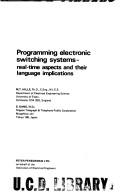
ISBN: 0901223808 9780901223807 Year: 1979 Volume: 3 Publisher: Stevenage Peregrinus
Abstract | Keywords | Export | Availability | Bookmark
 Loading...
Loading...Choose an application
- Reference Manager
- EndNote
- RefWorks (Direct export to RefWorks)
Telecommunication --- -Computer programming --- Telephone switching systems, Electronic --- #TCPW P4.7 --- #TCPW P5.2 --- 681.3*D32 --- 681.3*D33 --- Electronic switching systems (Telephone) --- Electronic systems --- Switching circuits --- Switching theory --- Telephone, Automatic --- Telephone stations --- Telephone systems --- Computers --- Electronic computer programming --- Electronic data processing --- Electronic digital computers --- Programming (Electronic computers) --- Coding theory --- Electric communication --- Mass communication --- Telecom --- Telecommunication industry --- Telecommunications --- Communication --- Information theory --- Telecommuting --- Switching systems --- language classifications: applicative languages data-flow languages design languages extensible languages macro and assembly languages nonprocedural languages specialized application and very high-level languages (Programminglanguages) --- Languages constructs: abstract data types concurrent programming structurescontrol structures coroutines (Programming languages) --- Programming --- Elektronische telefooncentrales --- Programmering --- Schakeltechnieken --- Telefonie --- Elektronische telefooncentrales. --- Programmering. --- Schakeltechnieken. --- Telefonie. --- 681.3*D33 Languages constructs: abstract data types concurrent programming structurescontrol structures coroutines (Programming languages) --- 681.3*D32 language classifications: applicative languages data-flow languages design languages extensible languages macro and assembly languages nonprocedural languages specialized application and very high-level languages (Programminglanguages) --- Telephone switching systems, Electronic. --- Computer programming --- 681.3*D33 Languages constructs: abstract data types; concurrent programming structures;control structures; coroutines (Programming languages) --- Languages constructs: abstract data types; concurrent programming structures;control structures; coroutines (Programming languages) --- 681.3*D32 language classifications: applicative languages; data-flow languages; design languages; extensible languages; macro and assembly languages; nonprocedural languages; specialized application and very high-level languages (Programminglanguages) --- language classifications: applicative languages; data-flow languages; design languages; extensible languages; macro and assembly languages; nonprocedural languages; specialized application and very high-level languages (Programminglanguages) --- Communication switching systems --- Switching systems (Telecommunication) --- Data transmission systems --- Computer programming. --- Switching systems. --- Telecommunication - Switching systems
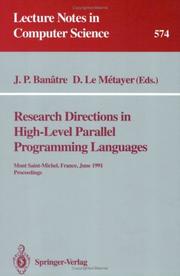
ISBN: 3540551603 0387551603 3540467629 Year: 1991 Volume: vol 574 Publisher: Berlin New York Springer-Verlag
Abstract | Keywords | Export | Availability | Bookmark
 Loading...
Loading...Choose an application
- Reference Manager
- EndNote
- RefWorks (Direct export to RefWorks)
This volume contains most of the papers presented at the workshop on research directions in high-level parallel programming languages, held at Mont Saint-Michel, France, in June 1991. The motivation for organizing this workshop came from the emergence of a new class of formalisms for describing parallel computations in the last few years. Linda, Unity, Gamma, and the Cham are the most significant representatives of this new class. Formalisms of this family promote simple but powerful language features for describing data and programs. These proposals appeared in different contexts and were applied in different domains, and the goal of the workshop was to review the status of this new field and compare experiences. The workshop was organized into four main sessions: Unity, Linda, Gamma, and Parallel Program Design. The corresponding parts ofthe volume are introduced respectively by J. Misra, D. Gelernter, D. Le M tayer, and J.-P. Ban tre.
-681.3*D13 --- Tools and techniques: decision tables flow charts modules and interfaces programmer workbench software libraries structured programming top-down programming user interfaces (Software engineering) --- language classifications: applicative languages data-flow languages design languages extensible languages macro and assembly languages nonprocedural languages specialized application and very high-level languages (Programminglanguages) --- Languages constructs: abstract data types concurrent programming structurescontrol structures coroutines (Programming languages) --- 681.3*D33 Languages constructs: abstract data types concurrent programming structurescontrol structures coroutines (Programming languages) --- 681.3*D32 language classifications: applicative languages data-flow languages design languages extensible languages macro and assembly languages nonprocedural languages specialized application and very high-level languages (Programminglanguages) --- 681.3*D22 Tools and techniques: decision tables flow charts modules and interfaces programmer workbench software libraries structured programming top-down programming user interfaces (Software engineering) --- Parallel programming (Computer science) --- 681.3*D13 --- 681.3*D22 --- 681.3*D32 --- 681.3*D33 --- 681.3*D33 Languages constructs: abstract data types; concurrent programming structures;control structures; coroutines (Programming languages) --- Languages constructs: abstract data types; concurrent programming structures;control structures; coroutines (Programming languages) --- 681.3*D32 language classifications: applicative languages; data-flow languages; design languages; extensible languages; macro and assembly languages; nonprocedural languages; specialized application and very high-level languages (Programminglanguages) --- language classifications: applicative languages; data-flow languages; design languages; extensible languages; macro and assembly languages; nonprocedural languages; specialized application and very high-level languages (Programminglanguages) --- 681.3*D22 Tools and techniques: decision tables; flow charts; modules and interfaces; programmer workbench; software libraries; structured programming; top-down programming; user interfaces (Software engineering) --- Tools and techniques: decision tables; flow charts; modules and interfaces; programmer workbench; software libraries; structured programming; top-down programming; user interfaces (Software engineering) --- 681.3*D13 Concurrent programming --- Concurrent programming --- Congresses --- Congresses. --- Parallel programming (Computer science) - Congresses. --- Computer network architectures. --- Computer science. --- Software engineering. --- Computer System Implementation. --- Programming Languages, Compilers, Interpreters. --- Programming Techniques. --- Software Engineering. --- Computer software engineering --- Engineering --- Informatics --- Science --- Architectures, Computer network --- Network architectures, Computer --- Computer architecture
Book
ISBN: 3540578595 0387578595 3642859852 3642859836 9783540578598 Year: 1994 Volume: 131
Abstract | Keywords | Export | Availability | Bookmark
 Loading...
Loading...Choose an application
- Reference Manager
- EndNote
- RefWorks (Direct export to RefWorks)
Constraint programming (Computer science) --- 681.3*D32 --- 681.3*D33 --- 681.3*F12 --- 681.3*I23 --- 681.3*I23 Deduction and theorem proving: answer/reason extraction reasoning resolution metatheory mathematical induction logic programming (Artificial intelligence) --- Deduction and theorem proving: answer/reason extraction reasoning resolution metatheory mathematical induction logic programming (Artificial intelligence) --- 681.3*F12 Modes of computation: alternation and nondeterminism parallelism probabilistic computation relations among modes relativized computation --- Modes of computation: alternation and nondeterminism parallelism probabilistic computation relations among modes relativized computation --- 681.3*D33 Languages constructs: abstract data types concurrent programming structurescontrol structures coroutines (Programming languages) --- Languages constructs: abstract data types concurrent programming structurescontrol structures coroutines (Programming languages) --- 681.3*D32 language classifications: applicative languages data-flow languages design languages extensible languages macro and assembly languages nonprocedural languages specialized application and very high-level languages (Programminglanguages) --- language classifications: applicative languages data-flow languages design languages extensible languages macro and assembly languages nonprocedural languages specialized application and very high-level languages (Programminglanguages) --- language classifications: applicative languages; data-flow languages; design languages; extensible languages; macro and assembly languages; nonprocedural languages; specialized application and very high-level languages (Programminglanguages) --- Languages constructs: abstract data types; concurrent programming structures;control structures; coroutines (Programming languages) --- Modes of computation: alternation and nondeterminism; parallelism; probabilistic computation; relations among modes; relativized computation --- Deduction and theorem proving: answer/reason extraction; reasoning; resolution; metatheory; mathematical induction; logic programming (Artificial intelligence) --- 681.3*I23 Deduction and theorem proving: answer/reason extraction; reasoning; resolution; metatheory; mathematical induction; logic programming (Artificial intelligence) --- 681.3*F12 Modes of computation: alternation and nondeterminism; parallelism; probabilistic computation; relations among modes; relativized computation --- 681.3*D33 Languages constructs: abstract data types; concurrent programming structures;control structures; coroutines (Programming languages) --- 681.3*D32 language classifications: applicative languages; data-flow languages; design languages; extensible languages; macro and assembly languages; nonprocedural languages; specialized application and very high-level languages (Programminglanguages) --- Computer programming
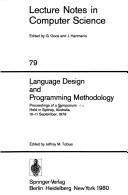
ISBN: 0387097430 0387097449 9786611953836 1281953830 0387097457 3540097457 3540385797 3540097430 3540385754 9783540097433 9783540097457 9780387097459 9780387097442 Year: 2009 Volume: 176 Publisher: New York, NY : Springer New York : Imprint: Springer,
Abstract | Keywords | Export | Availability | Bookmark
 Loading...
Loading...Choose an application
- Reference Manager
- EndNote
- RefWorks (Direct export to RefWorks)
Antisocial acts by children and teens are on the rise – from verbal abuse to physical bullying to cyber-threats to weapons in schools. Strictly punitive responses to aggressive behavior may even escalate a situation, leaving peers, parents, and teachers feeling helpless. This unique volume conceptualizes aggression as a symptom of underlying behavioral and emotional problems and examines the psychology of perpetrators and the power dynamics that foster intentionally hurtful behavior in young people. It details for readers how bibliotherapy offers relevant, innovative, and flexible treatment – as a standalone intervention or as a preventive method in conjunction with other forms of treatment – and can be implemented with individuals and groups, parents, teachers, and even rivals. Treating Child and Adolescent Aggression Through Bibliotherapy: Offers research-based guidelines for treating aggression in children and adolescents. Provides an integrative approach to treating aggressive children and youth to more fully address the complex nature of antisocial behavior. Sets out a practical framework for bibliotherapy, choosing developmentally appropriate materials, identifying themes for discussion, matching selections to therapeutic progress, and more. Demonstrates individual and group bibliotherapy sessions with male and female children and adolescents. Includes a complete session-by-session prevention program for the classroom. Features an appendix of suggestions for effective therapeutic literature. This unique, must-have resource is essential reading for school psychologists, school counselors, social workers, and clinical child psychologists and any allied educational and mental health professionals who work with troubled youth.
Aggression -- Psychology. --- Aggressiveness in adolescence -- Treatment. --- Aggressiveness in children -- Treatment. --- Bibliotherapy for children. --- Bibliotherapy for teenagers. --- Aggressiveness in children --- Aggressiveness in adolescence --- Bibliotherapy for children --- Bibliotherapy for teenagers --- Psychology --- Bibliotherapy --- Aggression --- Adolescent --- Child --- Methods --- Behavioral Sciences --- Social Behavior --- Age Groups --- Investigative Techniques --- Behavioral Symptoms --- Rehabilitation --- Psychotherapy --- Behavioral Disciplines and Activities --- Behavior --- Analytical, Diagnostic and Therapeutic Techniques and Equipment --- Therapeutics --- Persons --- Behavior and Behavior Mechanisms --- Named Groups --- Psychiatry and Psychology --- Pediatrics --- Medicine --- Health & Biological Sciences --- Treatment --- Treatment. --- Aggressiveness (Psychology) in adolescence --- Aggressiveness (Child psychology) --- Aggressiveness (Psychology) in children --- Tools and techniques: decision tables flow charts modules and interfaces programmer workbench software libraries structured programming top-down programming user interfaces (Software engineering) --- language classifications: applicative languages data-flow languages design languages extensible languages macro and assembly languages nonprocedural languages specialized application and very high-level languages (Programminglanguages) --- Languages constructs: abstract data types concurrent programming structurescontrol structures coroutines (Programming languages) --- Process management: concurrency deadlocks multiprocessing/multiprogrammingmutual exclusion scheduling synchronization (Operating systems) --- 681.3*D33 Languages constructs: abstract data types concurrent programming structurescontrol structures coroutines (Programming languages) --- 681.3*D32 language classifications: applicative languages data-flow languages design languages extensible languages macro and assembly languages nonprocedural languages specialized application and very high-level languages (Programminglanguages) --- 681.3*D22 Tools and techniques: decision tables flow charts modules and interfaces programmer workbench software libraries structured programming top-down programming user interfaces (Software engineering) --- 681.3*D41 Process management: concurrency deadlocks multiprocessing/multiprogrammingmutual exclusion scheduling synchronization (Operating systems) --- Diminishing returns --- Multiplication, Complex. --- Psychology. --- Education. --- Social work. --- Clinical psychology. --- Psychotherapy. --- Counseling. --- Child psychology. --- School psychology. --- Personality. --- Social psychology. --- Clinical Psychology. --- Child and School Psychology. --- Education, general. --- Psychotherapy and Counseling. --- Social Work. --- Personality and Social Psychology. --- Programming --- 681.3*A0 --- 681.3*D22 --- 681.3*D32 --- 681.3*D33 --- 681.3*D41 --- 681.3*D33 Languages constructs: abstract data types; concurrent programming structures;control structures; coroutines (Programming languages) --- Languages constructs: abstract data types; concurrent programming structures;control structures; coroutines (Programming languages) --- 681.3*D32 language classifications: applicative languages; data-flow languages; design languages; extensible languages; macro and assembly languages; nonprocedural languages; specialized application and very high-level languages (Programminglanguages) --- language classifications: applicative languages; data-flow languages; design languages; extensible languages; macro and assembly languages; nonprocedural languages; specialized application and very high-level languages (Programminglanguages) --- 681.3*D22 Tools and techniques: decision tables; flow charts; modules and interfaces; programmer workbench; software libraries; structured programming; top-down programming; user interfaces (Software engineering) --- Tools and techniques: decision tables; flow charts; modules and interfaces; programmer workbench; software libraries; structured programming; top-down programming; user interfaces (Software engineering) --- 681.3*A0 General --- General --- 681.3*D41 Process management: concurrency; deadlocks; multiprocessing/multiprogramming;mutual exclusion; scheduling; synchronization (Operating systems) --- Process management: concurrency; deadlocks; multiprocessing/multiprogramming;mutual exclusion; scheduling; synchronization (Operating systems) --- Adolescent psychotherapy --- Child psychotherapy --- Adolescent psychology --- Child psychology --- Conduct disorders in children --- Curves, Elliptic. --- Programming languages (Electronic computers) --- Computer programming --- Langages de programmation --- Programmation (Informatique) --- Congresses --- Congrès --- Psychology, clinical. --- Developmental psychology. --- Applied psychology. --- Consciousness. --- Apperception --- Mind and body --- Perception --- Philosophy --- Spirit --- Self --- Benevolent institutions --- Philanthropy --- Relief stations (for the poor) --- Social service agencies --- Social welfare --- Social work --- Human services --- Applied psychology --- Psychagogy --- Psychology, Practical --- Social psychotechnics --- Development (Psychology) --- Developmental psychobiology --- Life cycle, Human --- Software engineering. --- Software Engineering. --- Computer software engineering --- Engineering --- Children --- Education, Primitive --- Education of children --- Human resource development --- Instruction --- Pedagogy --- Schooling --- Students --- Youth --- Civilization --- Learning and scholarship --- Mental discipline --- Schools --- Teaching --- Training --- Psychology, School --- Psychology, Applied --- Behavior, Child --- Child behavior --- Child study --- Pediatric psychology --- Child development --- Developmental psychology --- Psychiatry --- Psychological tests --- Mass psychology --- Psychology, Social --- Human ecology --- Social groups --- Sociology --- Personal identity --- Personality psychology --- Personality theory --- Personality traits --- Personology --- Traits, Personality --- Individuality --- Temperament --- Counselling --- Helping behavior --- Clinical sociology --- Interviewing --- Personal coaching --- Social case work --- Therapy (Psychotherapy) --- Mental illness --- Mental health counseling --- Education --- Logique --- Courbes elliptiques --- Nombres, Théorie des --- Langages de programmation.
| Listing 1 - 7 of 7 |
Sort by
|

 Search
Search Feedback
Feedback About
About Help
Help News
News